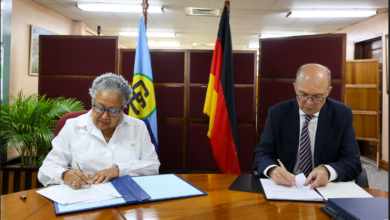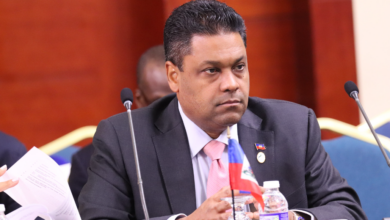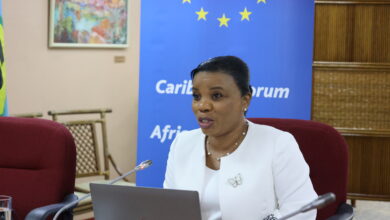I extend a warm welcome to you all to this Thirty-Seventh Meeting of the Council for Trade and Economic Development (COTED). I take this opportunity to give a special welcome to the Honourable Donville Inniss, Minister of Industry, International Business, Commerce and Small Business Development of Barbados, who is attending his first Meeting of this Council. Minister, welcome to COTED; and I know you are no stranger to our Community’s Organs, having been an active member of the Council for Human and Social Development (COHSOD) in your previous portfolio. I look forward to this Council benefitting from your insights and perspectives.
Honourable Ministers, Delegates, this is a particularly important Meeting, given its two-fold nature, with an entire day devoted to strategic planning. The discussions in this session will be an integral element of the Community’s agenda for change. As I address you today at this Special Session on the Strategic Direction of the COTED, I do so at a time when our Community is searching for answers. We are searching for answers on how best to advance the integration process. We are searching for answers to alleviate the low levels of growth and high levels of debt. We are searching for answers to raise employment levels, particularly among our youth. This Special Session is therefore set against the background of a quest for innovative ideas to drive the progress of our integration movement.
After forty years, our integration movement continues to endure, giving us cause for celebration in the midst of our reflection and introspection. And as any organisation which wishes to remain relevant to its members, we are engaged in seeking ways to improve the way we do business.
Our Community is in the process of reviewing every facet of its operations and institutions. The Heads of Government agreed that it was necessary to examine the future direction of the Community and to craft the requisite arrangements to govern the agreed structure.
Work has begun on the Five-Year Strategic Plan for the Community. The Change Facilitation Team has been canvassing the widest possible range of views. A series of in-country Consultations have taken place in 13 Member States and one Associate Member thus far, providing an opportunity for nationals to influence the plan and therefore, the direction of our Community. Sustainable economic growth is a recurrent theme in almost all of these Consultations.
Honourable Ministers, a rigorous session today would be of inestimable value to both the reform process and to the future operations of this Council. As you seek to evaluate the current and future role of the COTED, no doubt you will do so within the context of the current economic environment in which we operate.
COTED’s agenda and deliberations must be more strategic as they seek to address the challenges faced by our Member States. And the work of the Preparatory Meeting of the COTED must be such as to allow the Ministers space for strategic deliberations.
The role of the institutions that relate to COTED is equally important, as they are an integral part of our integration architecture and have been established to facilitate our economic and trading arrangements. COTED must ensure that any discussion on its future construct and operation must take a full account of that architecture.
Your deliberations should also be informed by the recent judgment of the Caribbean Court of Justice (CCJ) which has far-reaching implications for decision making and implementation, the nature and effects of Community law, obligations of Member States, and the rights of Community nationals. The Court’s judgments have cemented the rules-based system and thereby engendered confidence in the Community arrangements.
Each and every Member State party to the Revised Treaty of Chaguaramas has agreed to certain rights and obligations, and if the Community is to deepen its integration process, we all have a responsibility to ensure that we meet our obligations to each other. However, we must equally be aware of the constraints which may hinder our Member States from fulfilling those obligations and responsibilities.
As a Region we must collectively endeavour to put all our Member States on a sound footing in order to tackle the harsh economic realities head on. For CARICOM, enhancing competitiveness and expanding trade are crucial elements for propelling growth and improving the welfare of the Region. We must be fully aware of our challenges and limitations and seek to address these, both at the regional and national levels. I speak of challenges such as minimal export diversification and dependency on very few export markets, inadequate infrastructure, low competitiveness, high transport and transit costs, difficulties attracting foreign investment and the list goes on.
Addressing those challenges and key to achieving our economic goals is the full involvement of the private sector. As the COTED strategises on its future direction, I urge the Council to devise a mechanism to bring the regional private sector to the table. It is the private sector who produces. It is the private sector who trades.
Finally, Honourable Ministers, this is the opportune time to review how we are implementing the CARICOM Single Market and Economy (CSME) and whether the way we are going about it is adequate to address the immediate concerns of Member States. Just as we have agreed that the Revised Treaty must now be reviewed in order to advance our integration arrangements, we have to examine the role of the CSME in addressing the economic challenges of Member States. I remain convinced, however, that the CSME is our best option for addressing our economic challenges.
Honourable Ministers, the pillar of economic integration rests largely on the shoulders of the COTED and, as you deliberate on forging a strategy for the future operations of this Council and seek answers to boost our growth and development, there is an urgency which must infuse your deliberations.
I thank you.





